Get these four AIM shares at a big discount
14th June 2018 10:05
by Andrew Hore from interactive investor
Even though AIM has performed exceptionally well in recent years, there are still many companies offering fundamental value and trading below their asset value. However, investors need to find out what the assets are in order to assess how attractive an individual company is.
Roughly one-third of the companies quoted on AIM are trading at around their net asset value (NAV) or lower. That may sound a lot but there are property and investment companies included in that figure which will tend to trade at a discount to NAV.
There are also a number of resources companies. Most of these asset values will depend on the capitalised investment in exploration. That could be worth as much, or significantly more, than the balance sheet value if a discovery is made, but it could be written off if a commercial discovery is not made. This article is focusing on non-resources companies.
Things can change enormously from balance sheet to balance sheet. Fishing tackle retailer Fishing Republic was trading at a discount to both net assets and net tangible assets prior to its latest figures. Stock provisions and losses knocked around £2.2 million off the company's NAV, leaving it at £4.63 million – just below the current market capitalisation.
Many companies have a significant proportion of intangible assets as part of their NAV. That could be goodwill relating to past acquisitions or capitalised development costs. It is wrong to assume that intangible assets are not valuable, but they may be more difficult to value than tangible assets.
That said, even if tangible assets are sold at an inopportune time, they may not achieve their book value and could also be overvalued. Even so, they provide an indication of the true underlying value of a company and the intangible value of the business can be seen as additional upside.
If net tangible assets are used instead of NAV, around one-sixth of AIM companies trade at a discount. Again, these companies are dominated by property, resources and investment companies.
There are still many trading businesses that are trading at a discount to net tangible assets with a profitable business, or one that could move back into profit.
Getting value from assets
Hargreaves Services (HSP)
360p
£114 million
Hargreaves Services is involved in coal supply, transport, logistics and earthmoving. The company’s markets have been in a period of change, particularly coal, and Hargreaves has had to adapt. The business is still being restructured and it has property assets that could be worth more than their book value.
In the six months to November 2017, revenue fell from £170.9 million to £150.3 million. A loss was reported but the underlying pre-tax profit improved from £173,000 to £890,000. Three specialist earthwork contracts are still being completed and losing money for the group.
Hargreaves continues to pay regular dividends and special dividends could be paid out of the proceeds of disposals, or there could be further share buybacks. The interim dividend has been maintained at 2.7p a share.
Net debt was £20.6 million, down from £36.9m. Hargreaves continues to realise value from its property and energy assets. Only £2.4 million of the expected £35m has been achieved so far. Income of £27m has been generated from the sale of legacy assets with £33m more to come. This is enough to more than wipe out debt.
The NAV was £135 million at the end of November 2017. That is 423p a share. Net tangible assets were £123 million. The sale of the first part of the Blindwells site in East Lothian for housebuilding could happen in this financial year. The property assets have a book value of £31 million compared with a market value of £49 million.

Source: interactive investor Past performance is not a guide to future performance
Improving returns on assets
Goals Soccer Centres (GOAL)
87.2p
£65.2 million
Five-a-side football pitches provider Goals Soccer Centres is starting to generate improved revenues in the UK following years of disappointing results and it has a US joint venture with the owners of Manchester City provides long-term growth prospects.
Andy Anson took over as chief executive on 23 April and he has not had time to put his own strategy into place. He is focusing on improving the returns from the UK sites.
The modernisation programme is underway and the average pitch age has fallen from seven years to 4.1 years. There are signs of improvement, but it appears fragile at the moment. Stripping out the period of snow earlier this year, there has been a 2.3% like-for-like improvement in the first 18 weeks of the year. The effect of the snow was a revenue reduction of £500,000 so overall like-for-like revenues were 1.9% lower.
A third site in the US has been opened with another on the way. This is being financed by the joint venture and should not require further funds from Goals.
Full year pre-tax profit should edge up from £6.2 million to more than £6.5 million. That puts the shares on 14 times prospective earnings.
At the end of 2017, NAV was £98.4 milion and excluding intangibles the figure is £92.9 million, mainly due to the sites. Net debt was £29.8 million and cash generation should reduce that figure over the next couple of years.
In March, J O Hambro nearly doubled its stake to 10.5% and Mike Ashley's Sports Direct owns 18.9%, so they have confidence in the recovery potential of the business.
Ready for a shake up
Northamber (NAR)
29.1p
£7.9 million
Northamber is a distributor of technology equipment. It is moving into services, but these represent a small percentage of the business. It is loss-making, and this is gradually eroding its asset base, but it remains well above the market value.
Interim revenues increased by 9% to £31.6 million. This enabled the loss to be cut from £539,000 to £201,000. That reflects the move towards higher margin products and services.
Net tangible assets were £17.9 million at the end of 2017, with £2.2 million of that in cash. Debtor days did increase in the period and this meant that the cash outflow from operations was £2.73 million. The interim dividend is 0.1p a share.
Net tangible assets (and NAV) are double the current valuation but the worry is that the performance of the business needs to be improved or the asset base will decline over time. The assets are also dominated by trade receivables so bad debts could reduce the book value.
Michael Chadwick increased his stake to 4.1% in May. Executive chairman and founder David Philips owns 61.2% of the company and what eventually happens to this stake is going to be the key. That means that it is not likely to happen in the short-term.

Source: interactive investor Past performance is not a guide to future performance
Potential long-term recovery
Tasty (TAST)
22.7p
£13.6 million
High street restaurants are having a tough time at the moment and Tasty is no exception. It has stopped opening new restaurants for the time being and is still closing sites. Management does not anticipate a recovery in trading this year and operational efficiencies will not show through immediately.
Tasty has two chains at 60 locations. Most of its sites are Wildwood pizza, pasta, grill restaurants with the other six under the pan-Asian focused dim t fascia. Tasty has taken large write-offs on its property assets in the past two years. Last year, the figure for impairment and onerous lease provisions was £11.1 million, offset by a £1.2 million profit on property disposals. The previous year's write-off was £3.58 million.
Even after these write-offs, the property assets are still significant with leasehold properties making up the majority of the value. Net debt was £5.16 million at the end of 2017 and there is a provision of £1.66 million that will flow out in cash over two to three years. Since the year end, £1.45 million has been received for assigning a lease and £2.7 million was raised by the sale of a restaurant in Gloucester Road.
The NAV at the end of 2017 was £22 million and net tangible assets were £21.6 million. Even after a modest recovery in the share price, the market capitalisation of the company is two-thirds of that figure. Tasty generated £2.78 million of cash from operating activities in 2017. Utilising provisions will take up some of the cash generated this year and there will be lower investment in sites.
Tasty is backed by the Kaye family, which has had significant success in the past with the likes of ASK Central. That is no guarantee that Tasty will succeed, but it has already done a lot to offset the negatives and it survived the downturn a decade ago. Investors will need to be patient, and asset values could fall further, but there does appear to be medium-term value in the shares.
These articles are provided for information purposes only. Occasionally, an opinion about whether to buy or sell a specific investment may be provided by third parties. The content is not intended to be a personal recommendation to buy or sell any financial instrument or product, or to adopt any investment strategy as it is not provided based on an assessment of your investing knowledge and experience, your financial situation or your investment objectives. The value of your investments, and the income derived from them, may go down as well as up. You may not get back all the money that you invest. The investments referred to in this article may not be suitable for all investors, and if in doubt, an investor should seek advice from a qualified investment adviser.
Full performance can be found on the company or index summary page on the interactive investor website. Simply click on the company's or index name highlighted in the article.
Disclosure
We use a combination of fundamental and technical analysis in forming our view as to the valuation and prospects of an investment. Where relevant we have set out those particular matters we think are important in the above article, but further detail can be found here.
Please note that our article on this investment should not be considered to be a regular publication.
Details of all recommendations issued by ii during the previous 12-month period can be found here.
ii adheres to a strict code of conduct. Contributors may hold shares or have other interests in companies included in these portfolios, which could create a conflict of interests. Contributors intending to write about any financial instruments in which they have an interest are required to disclose such interest to ii and in the article itself. ii will at all times consider whether such interest impairs the objectivity of the recommendation.
In addition, individuals involved in the production of investment articles are subject to a personal account dealing restriction, which prevents them from placing a transaction in the specified instrument(s) for a period before and for five working days after such publication. This is to avoid personal interests conflicting with the interests of the recipients of those investment articles.